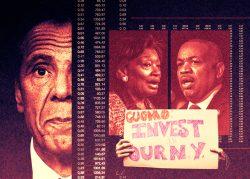Gov. Andrew Cuomo wanted to make it easier for owners to comply with New York City’s building emission caps. But as budget negotiations heat up, labor groups are suggesting tweaks, while others are calling for a completely alternative path.
As part of his proposed budget, the governor wants to allow property owners to buy renewable energy credits generated outside New York City to help meet new carbon emission caps put in place by the city’s Local Law 97.
But nine groups are instead calling on the city to create another option for compliance, such as the ability for property owners to invest in a fund that would pay for energy efficiency and electrification upgrades in affordable housing. The groups, including the Urban Green Council, the Alliance for a Greater New York and the Regional Plan Association, don’t want this issue handled in the state budget.
Read more



The groups also proposed limiting the number of renewable energy credits that could be purchased, based on a percentage of the building’s greenhouse emissions that are above the annual limit.
John Mandyck, CEO of the Urban Green Council, said “renegotiating Local Law 97 in the state budget won’t work,” and the proposal on the table fails to deliver a direct environmental benefit in the city, since the energy credits would go toward maintaining existing renewable energy facilities in other parts of the state. But the groups acknowledge that changes are needed to the local law.
“We get it. There are buildings that no matter what they do, can’t comply,” Mandyck said. “The worst thing we can do is just issue fines. Fines are just a lose-lose proposition.”
“We don’t need fines; we need carbon reduction,” he added.
Building service workers’ union 32BJ SEIU and the construction union umbrella organization, the Building and Construction Trades Council, have also put forward their own compromise, but one that would be part of the state budget. In a February memo, the groups voiced support for the option to buy energy credits elsewhere in the state, citing the lack of credits available within the city.
The groups, however, suggest what they see as “sensible amendments” to the governor’s proposal, floating a cap on the number of energy credits that can be used to offset emissions, limiting the application of the credits to building emissions related to electricity or finding other ways to invest in energy efficiency onsite. The groups also suggest only permitting the use of out-of-state credits until an “adequate amount of renewable power” is flowing into the city.
“While the grid is on its journey to becoming less carbon intensive, we need to give buildings every incentive that there is to become efficient and [to] electrify,” Kyle Bragg, president of 32BJ, said in a statement. “But it’s very hard to hold them accountable on the grid when buildings cannot control the grid’s efficiency, and need more flexibility.”
Gary LaBarbera, president of the BCTC, said the governor’s proposal helps ensure that the goals of Local Law 97 are met.
“Good middle-class careers will be central to New York’s sustainable economy and to advancing our climate goals, and these thoughtful and practical amendments to Local Law 97 help ensure just that,” he said.
The state Assembly and Senate are working on their own budget proposals. Some state and city elected officials have criticized the governor’s proposal, saying it would wrongfully circumvent city law at the behest of the real estate industry.
